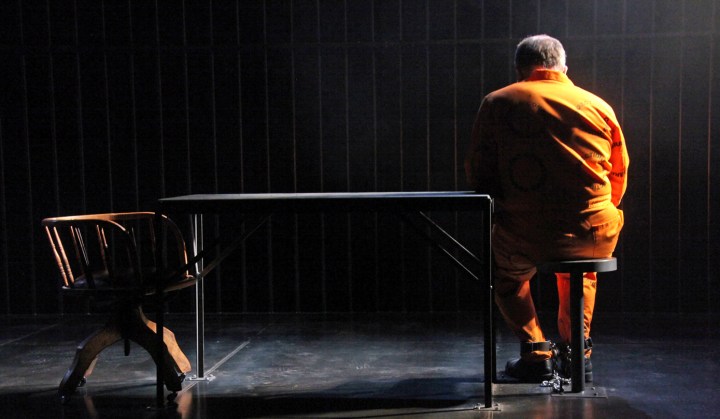Maverick Life
Theatre review: When humanity dies

Can we ever eliminate evil if we don’t understand where it comes from? Locking up criminals only deals with the symptoms of crime and violence, not the causes. And while we are often horrified yet strangely fascinated by the results of evil, we don’t really understand the motivation behind it. It’s a question addressed masterfully in A Human Being Died That Night, writes LESLEY STONES.
I feel a little closer to understanding evil after watching A Human Being Died That Night, a brilliant, searing play about Apartheid assassin Eugene de Kock. This play by Nicholas Wright is utterly compelling and intriguing.
It’s based on the book written by psychologist Pumla Gobodo-Madikizela after her depth-plumbing interviews with De Kock in jail.
The Apartheid assassin nicknamed ‘Prime Evil’ was the head of the regime’s death squads, conducting killing missions in South Africa and across the borders.
He was sentenced to 212 years in jail for crimes against humanity, murder and other charges.
Madikizela served on the Truth and Reconciliation Commission, where De Kock came clean then asked to meet the widows of three policemen he had killed so he could apologise in person. Gobodo-Madikizela was intrigued, and arranged her interviews in Pretoria Central Prison to investigate what motivated his actions.
Wright constructed the play by using the text from Gobodo-Madikizela’s book, the tapes from her interviews, recordings from the Truth and Reconciliation Committee, and some dialogue of his own invention.
Actors Noma Dumezweni and Matthew Marsh deserve as much credit as the script for delivering a power-packed performance that draws you forward in your seat. You’re barely watching a play; you’re watching a conversation, a live interview. You forget this isn’t really him and isn’t really her. You start analysing De Kock’s face – sorry, Marsh’s face – to see if you can add any judgment of your own.
The play is tight and tense, beginning with Dumezweni at a podium telling an audience about her experience. Then a curtain pulls back and we’re entering the prison cell where De Kock is chained, an almost avuncular man, welcoming and engaging.

Dumezweni as Gobodo-Madikizela is nicely in command yet almost in awe of the human in front of her. Afraid, she says, of discovering that the perpetrator of such evil is as human as she is.
She asks her questions, probing to see if evil may evolve from an unhappy childhood or being a misfit at school. There are no glib answers.
Maybe the regime’s commanders spotted some inherent taste for violence in him and put him to the test, De Kock suggests. Be grateful nobody has tested you that way, he says.
At one stage he snaps at his questioner, urging her to work harder, dig deeper, get her hands dirty. She cannot remain detached if she truly wants to understand.
The conversation is fast, brittle and burning as the description of his activities flow, most as sordid, regretful memories told as facts, not confessions.
March is mesmerising as he describes the murders his character committed. He has wriggled into De Kock’s soul so completely that maybe he needs to shower and scrub himself each night after this performance, just as De Kock tells of scrubbing off his own skin to remove the sickening smell of blood.
Dumezweni is equally engrossing, returning to the podium to tell us how the interviews affected her as she finds the man beneath the monster.

Numerous insightful comments paint us all guilty, not just the man in chains. “White South Africans needs a scapegoat, black South Africans needed a culprit,” he says. The whites wanted to be protected, and didn’t care how it happened. Anything to make sure they could keep their massive homes and second or third cars. The points hit home, delivered with a shrug, not a shout.
There’s a welcome vein of humour and irony too, again arising from the superb way Wright presents the rich material supplied by Gobodo-Madikizela and De Kock. One of his convictions was for fraud, he says, which was ludicrous when the whole system was corrupt. “There was never an entry in a book saying R5,000 for letter bombs,” he quips.
The two actors and the excellent director Jonathan Munby are all British and the play was first performed in London. It needs to be seen here, where we all have a vested interest in coming to terms with the past.
My partner, a white man of the era, was both gripped and moved. “It’s an eye opener for me,” he said. “You knew these guys existed but you didn’t want to go anywhere near them. They were rougher and tougher. This is an interesting exploration of how they may have felt.”
It certainly is. Marsh describes the warfare in such vivid detail that you can picture the events. At one stage, he describes how he killed one victim as he surged through a window trying to escape an ambush. That’s the man whose blood he could not wash off in the shower, whose face will always remain seared in his memory. Like Lady Macbeth on a grander, bloodier scale.
When he quietly says, “A human being died that night”, I don’t know whether he is talking about the victim, or about De Kock himself. DM
A Human Being Died That Night runs at the Market Theatre until 6 April. Tickets from Computicket.
Photos: Ruophin Coudyzer.



















 Become an Insider
Become an Insider